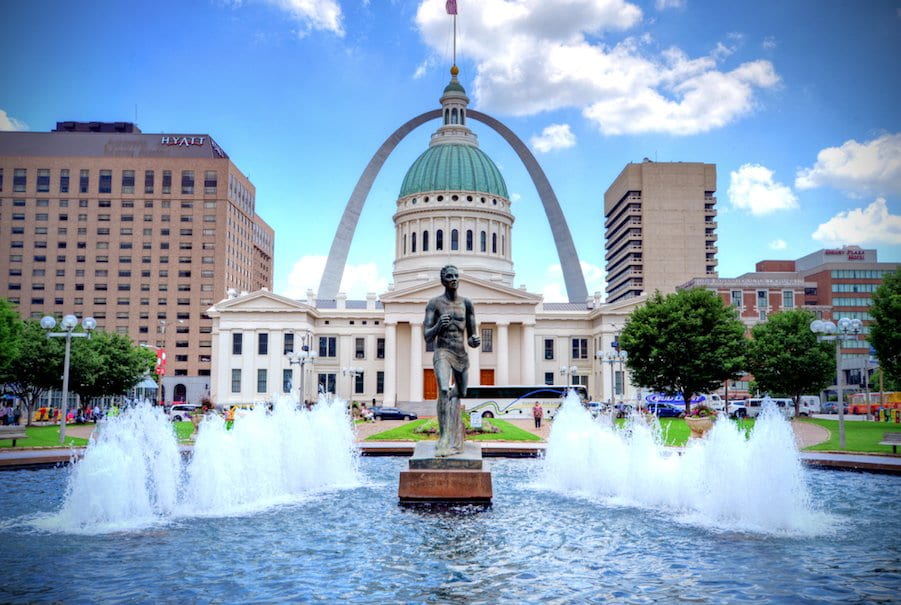There’s something special about St. Louis. I’ve lived here for the majority of my adult life, and I’ve come to find that the “something special” resides in the people who take great pride in this city, its sports teams, its architectural icons, and its cultural establishments.
Here at Washington University, we also take great pride in being located “in St. Louis.” Heck, it’s imprinted on the banners surrounding our Danforth campus and the reason we changed our name to Washington University in St. Louis in 1976.
St. Louis is also unique. Neither East nor West, North nor South — St. Louis truly is at the epicenter of our nation. We are a confluence of cultures, a meeting place of beliefs, attitudes, and perspectives. We have our own set of opportunities and successes. As WashU’s seventh Chancellor Herbert Hadley once said, “We have sunshine enough for sentiment and snow enough for courage.”
And, although many attribute positive qualities to St. Louis as Chancellor Hadley did, it’s paramount to remember that we also come with our own set of historic and contemporary challenges.
Here in St. Louis, we are serious about our sports teams. We have an eclectic array of art, music, and theater offerings and opportunities. We are known for our craft breweries, classic diners and dives, and historic restaurant rows. Our distinct neighborhoods are both rooted in heritage and poised with opportunities for the future.
We also have segregation, housing concerns, malnutrition, and gun violence. We have educational gaps, inequalities in health, pay imbalances, and stagnant population growth. We have abuse, neglect, mental illness, suicide, and trauma.
As a St. Louis community, we have all of these things at once. It’s what makes us who we are, and it’s what makes us a city in need of continued growth and evolution. And as a Washington University community, it is our missional responsibility to stand within our community — to celebrate, bolster, and uplift those things in which we take deep pride as well as help understand, address, and mitigate the challenges that, at times, prevent us from moving forward. At the same time, we must leverage the former to benefit the latter.
Chancellor Herbert Hadley wasn’t the only predecessor who had something to say about our role in the St. Louis region. In fact, during the Great Flood of 1993, Chancellor Danforth wrote extensively about this central aspect of our mission. He said:
“The Flood of ’93 has dominated the news about St. Louis…The response of the community, including Washington University people, has been magnificent. The flood has shown the human spirit at its best.”
From faculty, staff, and students filling sandbags to serving at shelters, packing supplies, answering hotlines, and raising money; the Brown School lending public health and social work support; and the Medical Center making 50 apartments available for displaced families — WashU showed up in a big way.
Twenty-six years later, and we must keep showing up and making an impact — not just in times of crisis, but all the time. And not just for the wider community, but within our closest municipalities and neighborhoods where there are imminent and quotidian struggles. We must show up when our neighborhoods struggle with violence and brutality. We must show up when folks struggle to achieve economic mobility. We must show up when people’s well-being and safety are at risk — including people of color, women, children, people living with disabilities, and people who identify as LGBTQ+. We must show up when members of the community lack access to adequate health care or the educational tools to make healthy decisions.
To reframe Chancellor Hadley’s perspective, this is what it means to have “sunshine enough for sentiment and snow enough for courage” as we devote ourselves to the city that informs our namesake.
Chancellor Danforth concluded his 1993 Thanksgiving letter by describing what I believe is one of WashU’s most defining and distinguishing qualities. He said:
“I count as blessings the friends of Washington University whose generosity and concern for others find expression in building a great institution of learning that contributes to the preservation and enhancement of civilization and to the education of a new generation of leaders.”
Indeed, WashU was founded particularly to provide increased educational access to those living in the region who would go on to become leaders of our organizations, our city, our state, and our country. Our primary goal was to continue to uplift our “great American city” through education, research, and eventually patient care. To that end, St. Louis should continue to be a central aspect of who we are as we make good on our founding principles.
As WashU’s Chancellor, this will be one of my biggest priorities — to continue to fulfill our mission to improve lives through our excellent teaching, research, service, and patient care. This especially means being good neighbors as we exemplify the “in St. Louis” part of our name and our identity.
